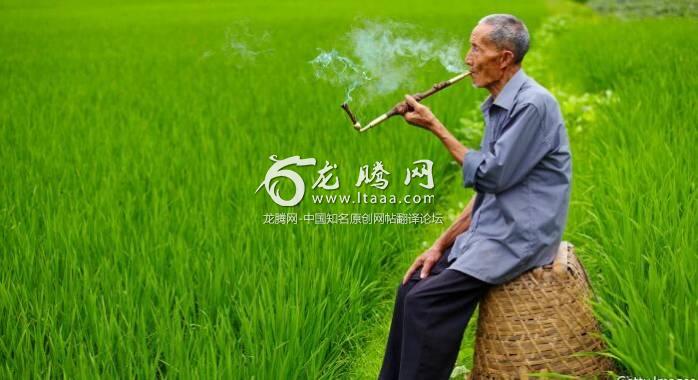【经济学人】远大梦想:中国为何需要大农场 [英国媒体]
张新生是最近被评选的农业劳模。他不是饱经风霜的农民,而是四家公司的老板,拥有一座农场,蔬菜被种在塑料大棚里。2012年,他在中部河南省创立了农业公司。张先生花了6个月说服村民出租土地,共积累了53公顷(130英亩)土地......
Dreaming big
远大梦想
Why China needs bigger farms
中国为何需要大农场
Despite huge improvements since Mao’s dire day, farming in China is still woefully inefficient
自毛时代以来,中国的农业取得了巨大进步,但生产效率仍然很低
COMMUNIST countries have always liked model workers. Zhang Xinsheng is China’s latest farmer to be anointed. He is no gnarled son of the soil but the owner of four companies and a farm where vegetables are grown under plastic sheets. In 2012, when he set up his agricultural venture in the central province of Henan, it took Mr Zhang six months to amass 53 hectares (130 acres) by persuading villagers to lease their plots of land. In 2017 he assembled another 47 hectares in half that time—thanks, he told a local newspaper, to rural land reforms. He plans to triple his farm’s size and turn the village, Luodian, from a poor grower of grain into a specialist producer of vegetables.
GCZY国家一直喜欢劳模,张新生是最近被评选的农业劳模。他不是饱经风霜的农民,而是四家公司的老板,拥有一座农场,蔬菜被种在塑料大棚里。2012年,他在中部河南省创立了农业公司。张先生花了6个月说服村民出租土地,共积累了53公顷(130英亩)土地。2017年,他又花了3个月积累47公顷土地,他向当地报纸透露,这得益于农村土地改革。他计划将农场规模扩大两倍,把罗甸村从一个贫穷的种粮村庄变成一个专业的蔬菜生产商。
Mr Zhang’s story exemplifies a profound transformation in Chinese agriculture that has been unfolding since the 1980s. It involves a shift away from a preoccupation with producing enough grain for the country’s needs, towards boosting rural incomes by encouraging farmers to grow more profitable crops and use scarce arable land more efficiently. The government is eager to speed up this change. It is not proving easy.
张先生的故事说明中国农业自80年代以来发生了深刻变革。中国农业不再专注于生产足够粮食来满足国家的需要,而是鼓励农民种植更有利可图的作物来增加收入,并更有效的利用稀缺耕地。政府渴望加快这种转变,但这并非易事。
China grows enough staples to feed its 1.4bn people. The rice crop of 2017 was a record; output of grains has risen more than 40% since 2003. Cereal yields per hectare are higher than Canada’s. This is a stunning success for a country where millions starved in Mao’s Great Leap Forward, and has freed millions from the rural grind to join China’s industrial revolution.
中国种植的粮食足以养活14亿人口。2017年的水稻产量创下历史新高;2003以来谷物产量增长了40%以上;每公顷的谷物产量已高于加拿大。这是惊人的成就,因为数百万人曾在毛的“大跃进”中挨饿,如今数百万人从农村的艰苦劳动中解放出来,加入中国的工业革命。
But these feats on the farm have come at a cost. China uses twice as much fertiliser and pesticide per hectare as the world average, contributing to catastrophic levels of soil pollution. In northern China, the country’s bread basket, wheat farmers use far more water than this bone-dry region can afford or replace. And because food quantity has taken priority over quality, there have been huge food scares.
但这些农业成就是有代价的,中国每公顷土地所用的肥料和农药是世界平均水平的两倍,造成了灾难性的土壤污染。在中国的北方粮仓,种植小麦的用水量远远超过这个干旱地区所能承受和再生的能力。由于粮食产量的重要性超过了质量,因此出现了巨大的食品恐慌。
The rural economy remains backward. A recent agricultural census showed there were 314m people employed in farming in 2016. That is 40% of China’s workforce. Yet agriculture accounts for less than 9% of GDP, which means that rural labour is still extremely unproductive.
农村经济依然落后。最近一次农业普查显示,2016年有3.14亿人从事种植业,占全国劳动力的40%,但农业在GDP中所占比例不到9%,这意味着农村生产力依然很低。
Moreover, the exodus from the land has slowed, implying that the problem of underemployment is not going away. The farming population fell by 100m in the decade to 2006 but only 28m in the following ten years. Most of those still tilling the fields are old and ill-schooled. In 2016 more than half of all farmers were over 55 and almost half had only a primary education.
此外,农村人口的迁出速度已经放缓,表明就业不足的问题仍然存在。在截至2006年的10年里,农业人口减少了1亿,但接下来10年只减少了2800万。仍在耕地农民多是老年人,没有受过良好教育。2016年,超过一半的农民超过55岁,几乎一半农民只有小学文化。
Since all successful Chinese revolutions have begun in the countryside, the Communist Party is alarmed. In October China’s president, Xi Jinping (whose PhD thesis was on “rural marketisation”), unveiled a “revitalisation strategy” for the countryside that would “prioritise agriculture”. Though vague, the strategy signals a renewed emphasis on reforming two vital aspects of farming.
由于所有成功的中国革命都始于农村,所以中国对此很警惕。今年10月,中国国家主席(他的博士论文是“农村市场化”)公布了农村“振兴战略”,将优先发展农业。虽然不够具体,但该战略标志着重新强调农业的两个重要方面。
First, prices. This year, for the first time, the government will lower the guaranteed sum that it pays farmers for wheat. Minimum prices for maize and rapeseed were scrapped in 2015. This shift should encourage greater efficiency. There will be less incentive for farmers to grow grain in places where it is costly to do so, such as in the north where water is scarce. The government will still help them, however, by boosting farm subsidies.
首先是价格。今年,政府将首次降低小麦的最低收购价格。2015年,玉米和油菜籽的最低价格被取消。这种变化应该能提高生产效率,在种植成本高的地区,农民种植粮食的动力会减少,比如水资源短缺的北方。然而,政府仍政府仍将通过增加农业补贴来帮助他们。
The legacy of Mao
Just as important are changes to land tenure, aimed at encouraging the growth of larger farms and new investment in them. Almost all farmland in China is owned by village collectives. In the 1980s households were given the right to use a portion of the land for themselves. Since 2008 they have had the right to lease these rights to others (this is how Mr Zhang put together his vegetable operation). But there has been a bottleneck: a lack of legal clarity about the boundaries of farmers’ fields. This has hampered the growth of larger farms. The recent census found only 4m “scaled-up farms”, 2% of the total. Almost 30% of them were in livestock or fish farming, compared with only 4% for all farms. This reflects the continued importance of ideology: animals are regarded as private property but land as collective. This impedes the growth of large, privately owned, crop-growing ventures. Mao hated rural landlords (millions of them may have died in his purges). His thinking endures among bureaucrats.
毛的遗患
同样重要的是土地所有制改革,旨在鼓励大农场的发展和新的投资。中国几乎所有的农田都是村集体所有。80年代农民被赋予使用部分土地的权利,2008年被赋予出租土地的权利(张先生的蔬菜公司就是这样发展起来的)。但也存在一个瓶颈:法律对农村土地界限没有明确规定,阻碍了大型农场的发展。最近人口普查显示只有400万座“大规模农场”,仅占总量的2%,其中近30%用于畜牧或养鱼业。在所有农田中,这一比例仅为4%。这反映出一种意识形态的重要性:动物属于私人财产,土地属于集体财产,这阻碍了种植作物的大型私企的发展。毛憎恶农村地主(他的清洗运动可能导致了数百万地主死亡),中国官僚仍在延续他的思想。
In 2018 officials will complete work on handing out certificates to farmers with details of their plot boundaries. This should spur consolidation. Even so, it will remain hard for people like Mr Zhang to borrow money to rent land, since land-use rights cannot be used as collateral. Pilot programmes allowing this are under way, but there is no nationwide scheme. And there is no hint that China is willing to let farmers own land in order to capture the benefit of rising land prices—a common route to wealth for farmers in other countries but still anathema to the party’s ideologues. Until that happens, the growth of large farms is likely to remain slow.
2018年,官员将完成向农民发放土地证书的工作,并详细规定土地界限。这应该能促进土地合并,但对张先生这样的人来说,借钱租用土地还是困难,因为土地使用权不能用作抵押。允许这种做法的试点项目正在进行,但目前没有全国性计划。也没有迹象表明中国愿意让农民拥有土地,进而从土地价格上涨中获利。在其他国家,这是农民致富的普遍途径,但仍然是中国理论家们所厌恶的。除非这样做,否则大农场的发展仍将缓慢。
版权声明
我们致力于传递世界各地老百姓最真实、最直接、最详尽的对中国的看法
【版权与免责声明】如发现内容存在版权问题,烦请提供相关信息发邮件,
我们将及时沟通与处理。本站内容除非来源注明五毛网,否则均为网友转载,涉及言论、版权与本站无关。
本文仅代表作者观点,不代表本站立场。
本文来自网络,如有侵权及时联系本网站。
图文文章RECOMMEND
热门文章HOT NEWS
-
1
最近,新冠肺炎疫情在日本有扩大的趋势,有专家呼吁日本应当举国行动起来,共...
- 2
- 3
- 4
- 5
- 6
- 7
- 8
- 9
- 10
推荐文章HOT NEWS
-
1
最近,新冠肺炎疫情在日本有扩大的趋势,有专家呼吁日本应当举国行动起来,共...
- 2
- 3
- 4
- 5
- 6
- 7
- 8
- 9
- 10











